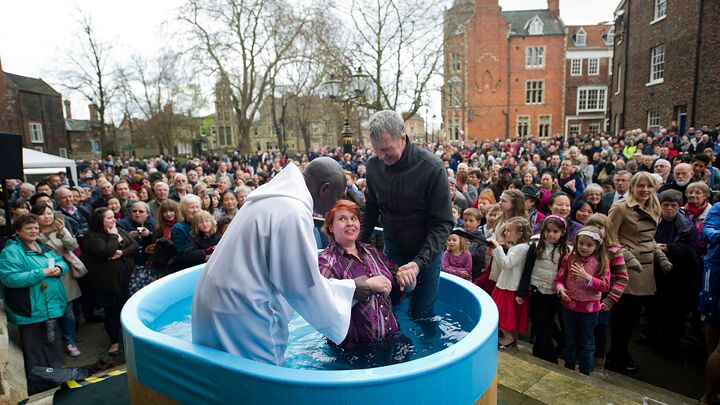
Church of England Unwilling to Tell Its Members to ‘Submit’
The Church of England is testing a new version of its christening ceremony in which its members are no longer told to “repent” or “submit” to Christ.
The baptism ceremony is the single most important ceremony in the life of a Christian. (This is why the Bible commands that adults, and not children be baptized. For more on this subject read “The Truth on Water Baptism.”) Changing this ceremony has major implications for the whole religion.
The old text asked, “Do you reject the devil and all rebellion against God?” and “Do you repent of the sins that separate us from God and neighbor?” The new text simply says, “Do you reject evil? And all its many forms? And all its empty promises?”
The new text will be offered as an alternative to the old for the next few months. After this it will be reviewed, but will probably be adopted as an official alternative.
Supporters of the new text claim that people no longer understand the old services, with its religious words such as “sin.” In this they are right: If they spelled out exactly what “sin” and “repentance” mean, the new text would be a great improvement.
Instead “sin” has been replaced by the general term “evil.” Sin has a very specific meaning—the violation of God’s law (1 John 3:4). Evil, on the other hand, is vague, reserved in most people’s minds for unthinkable crimes—like mass murder or genocide.
But perhaps the most revealing change is the removal of the word “submit.” The Telegraph notes: “The congregation is no longer asked to ‘submit to Christ as Lord’ as the idea of submission is considered too controversial, particularly for women.” Instead the congregation agrees to “follow” Christ—another vague term. The term “submit to Christ” is crystal clear even today—it means that you must do everything He says. Following someone is more like what you do on Twitter—occasionally pay attention to their words.
This gets to the core of what these changes are about. The Church of England will still offer the old form of baptism. But if a new member, or his parents, doesn’t like it, they can choose the watered-down version. They won’t be told that they have to submit to Christ. They are not told to repent—which means to change. The removal of the word “sin” eliminates any connection to God’s law. The church no longer wants to tell people that being a church member actually involves obeying law and acknowledging an authority higher than their own. You don’t really have to do much at all, they now say. As long as you avoid doing what you regard as evil, you’re fine.
The Church of England is the official, established church in Britain. It is supposed to be the conscience of the nation. This is a role the church is eager to play when it comes to telling the government that it’s not spending enough taxpayer money on welfare. But it would rather not say that Christianity actually involves submitting to Christ.
In making this change, the church is merely reflecting wider society. The idea of submitting to any code of conduct other than your own is in retreat. Instead, individuals are left to choose for themselves what is right and wrong. This attitude is at the heart of so many of Britain’s problems. You cannot tell people that one type of family is better than another. Promoting marriage is wrong, because it means “judging” single mothers. Telling people to change their behavior for their own good is taboo. Even a chef was recently shouted down for telling poorer people that they need to change their diets in order to be healthy: How dare he be so judgmental!
Now even the Church of England has adopted this attitude. When even a nation’s established church refuses to say what is right and wrong, you know the country is in trouble. For why this approach cannot work, see our article “The Voice Inside You.”
